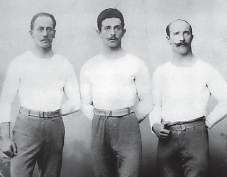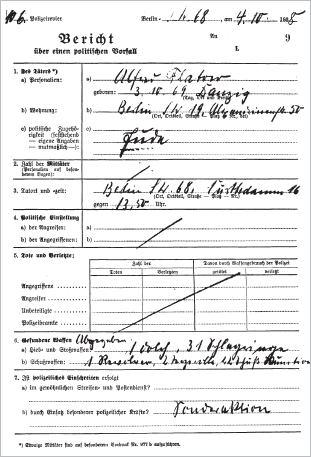Read Gun Control in the Third Reich Online
Authors: Stephen P. Halbrook
Gun Control in the Third Reich (34 page)
Der Bund
Der Strümer
Der Völkische Beobachter
Deutsche Allgemeine Zeitung
Deutsche Juristen-Zeitung
Deutsche Schützen Zeitung
Deutsche Welle
Evening News
Fränkische Tageszeitung
Freiburger Tagespost
Freiheit
Grenzecho
Hamburger Tagblatt
Jour-Echo de Paris
Journal de Genève
Kölnische Volkszeitung
Le Matin
Neue Zürcher Zeitung
New York Times
Nowy Kurjer Warszawski
Reichsgesetzblatt
Time Magazine
The Times
Völkischer Beobachter
Vorwärts
Washington Post
Legal Citations
Brief of Amicus Curiae Jews for the Preservation of Firearms Ownership in Support of Respondent,
District of Columbia v. Heller
, No. 07-290.
Brief Supporting Petitioners of Amici Curiae American Jewish Committee,
et al., District of Columbia v. Heller
, No. 07-290.
Davis v. United States
, 328 U.S. 582 (1946).
District of Columbia v. Heller
, 554 U.S. 570, 128 S. Ct. 2783 (2008).
Federal Firearms Legislation: Hearings Before the Subcommittee to Investigate Juvenile Delinquency
. U.S. Senate Committee on the Judiciary, 90th Cong., 2nd Sess. (1968).
Ludecke v. Watkins
, 335 U.S. 160 (1948).
Human Rights Council, Subcommission on the Promotion and Protection of Human Rights, 58th sess., agenda item 8, Adoption of the Report on the Fifty-Eighth Session to the Human Rights Council, A/HRC/Sub.1/58/L.11/Add.1 (Aug. 24, 2006).
Property Requisition Act, P.L. 274, 55 Stat. 742 (1941).
German Judicial Decisions
Decision of Oct. 16, 1919, III 490/19, Regional Court [Landgericht] Güstrow,
Entscheidungen des Reichsgerichts in Strafsachen
[Decisions of the Reich Court in Criminal Matters] (Berlin & Leipzig 1920), Band 54, S. 4.
Decision of Feb. 23, 1922, Regional Court [Landgericht] Kassel,
Entscheidungen des Reichsgerichts in Strafsachen
[Decisions of the Reich Court in Criminal Matters] (Berlin & Leipzig 1922), Band 56, S. 283.
Decision of June 4, 1926, I 231/26, Court Sitting With Professional Judges and Lay Judges [Schwurgericht] Mosbach,
Entscheidungen des Reichsgerichts in Strafsachen
[Decisions of the Reich Court in Criminal Matters] (Berlin & Leipzig 1927), Band 60, S. 266.
Decision of Nov. 4, 1926, Regional Court [Landgericht] Stade,
Entscheidungen des Reichsgerichts in Strafsachen
[Decisions of the Reich Court in Criminal Matters] (Berlin & Leipzig 1927), Band 60, S. 419.
Decision of May 23, 1932, III 235/32, Regional Court [Landgericht] Kassel,
Entscheidungen des Reichsgerichts in Strafsachen
[Decisions of the Reich Court in Criminal Matters] (Berlin & Leipzig 1933), Band 66, S. 249.
Decision of May 23, 1932, II 496/32, Reich Court,
Entscheidungen des Reichsgerichts in Strafsachen
[Decisions of the Reich Court in Criminal Matters] (Berlin & Leipzig 1933), Band 66, S. 262.
Decision of January 21, 1937, Regional Court [
Landgericht
] Allenstein,
Entscheidungen des Reichsgerichts in Strafsachen
(Berlin & Leipzig 1938), Band 71, S. 40.
DVD
Geheime Reichssache: Die Angeklagten des 20.Juli vor dem Volksgerichtshof
(Potsdam Babelsberg: Chronos, n.d.).

Heinrich Brüning, Reich Chancellor in 1930â32, near the end of the Weimar Republic. (Photo courtesy of Bundesarchiv BArch, Bild 119-2600/CC-BY-SA 3.0)
      Brüning relied on the Enabling Act to issue “emergency decrees,” like the 1931 “Measures Against Weapon Misuse” (below). The decree began: “The highest State authoritiesâ¦may order that in their jurisdiction, the possession of firearms and ammunitionâ¦must be registered with the police authorities.” § 1(1). It then said that firearms may, “if the maintenance of public security and order so requires, be taken into police custodyâ¦.” § 1(2). (
Source: Reichsgesetzblatt
, I, S. 699, 742.)

Reich Interior Minister Wilhelm Groener issued directives to the States to implement the registration decree. On February 8, 1932, he warned them to provide for “the secure storage of the lists of persons who have registered their weapons. Precautions must be taken that these lists cannot, in local disturbances, fall into the hands of radical elements.” He did not anticipate that the lists would fall into the hands of radical elementsâthe Nazisâwhen they seized power just a year later. (Photo courtesy of Bundesarchiv. BArch, Bild 102-01049/CC-BY-SA 3.0)


SS and criminal detectives search for firearms and subversive publications in Berlin's Jewish Quarter, April 4, 1933. The caption states: “Raid in the Scheunenviertel [Barn District]. The police blocked and searched Dragoon and Grenadier Streets, which since the Revolution had been a breeding ground for Hebrews of Galician and Polish descent.” (
Völkische Beobachter
, April 5, 1933. This was the primary official newspaper of the Nazi party. The “Revolution” referred to the Nazi seizure of power.)

Elderly Jewish man arrested at the raid being interrogated by Berlin Political Police Commissioner Kurt Fähnrich. The interview is being broadcast on the radio for propaganda purposes. The caption states: “Interrogation in front of a microphone: Kommissar Fähnrich is talking to a Jew about his arrestâand the Jew is unable to find any reason for it.” (
Source: Völkische Beobachter
, April 5, 1933.)

Werner Best's directive of December 16, 1935, entitled “Issuance of Weapons Permits to Jews” to all Gestapo, State Police, and Political Police authorities in Prussia and the German States. (Document courtesy of Bundesarchiv. Erteilung von Waffenscheinen an Juden, R 58/276.)

Werner Best, who proposed in 1931 that, in event of a Nazi takeover, anyone not surrendering firearms in 24 hours would be executed. After the Nazis came to power, he became chief legal advisor to the Gestapo. During World War II, he headed implementation of the policy of the death penalty for firearm possession in occupied France and Denmark. (Photo courtesy of Bundesarchiv. BArch, Bild 183-B22627/CC-BY-SA 3.0)
Translation:
With regard to the issuing of firearms permits to Jews, the regular police authorities must always obtain the opinion of the Gestapo authorities on the political reliability of the individual applicant. I direct that the following be heeded:
In principle, there will be very few occasions where concerns will not be raised regarding the issuance of firearms permits to Jews. As a rule, we have to assume that firearms in the hands of the Jews represent a considerable danger for the German people. Therefore, in the future, an extreme measure of scrutiny will have to be applied to the question of political reliability of the applicant in all cases where an opinion needs to be given about the issuance of firearms permits to Jews. Only in this way will we be able to prevent numerous Jews from obtaining firearms and causing danger to the German population.

German gold medal winners in gymnastics at the 1896 Olympics: (left to right) Herman Wein gärtner, Alfred Flatow, and Karl Schumann. In 1942, Flatow, then 73 years old, was ordered to be deported because he was Jewish. Schumann pleaded with the Reich Sport Leader to intervene, but was rejected. Flatow was sent to the Theresienstadt concentration camp where he quickly died of starvation. (Original photo by Albert Meyer in public domain.)

Pursuant to the 1931 Weimar decree, Flatow registered several weapons. In October 1938, several weeks before the Night of the Broken Glass, he surrendered his registered arms pursuant to the Nazi action to disarm the Jews. The police verified that the weapons were registered but handed him over to the Gestapo anyway. His arrest report is reproduced below. (Document courtesy of Landesarchiv Berlin. Bericht über einen polit. Vorfall, 4.10.38, Alfred Flatow. A Rep PrBrRep. 030/21620 Bd. 5 Haussuchungen bei Juden 1938-39.)
Translation:
Police Station 106
Berlin, SW 68, on October 4, 1938
Report Concerning Political Incident.
1. Perpetrator
a) Person: Alfred Flatow Born: October 3, 1869, Danzig
b) Address: Berlin SW 19, AlexandrinenstraÃe 50.
c) Political affiliation: Jew
3. Crime scene and time: Berlin SW 68, Curdtdamm 16, at 1:50 p.m.
[Note: this was the address of the police station, not a crime scene. Flatow was surrendering his arms there.]
6. Weapons Found: Surrendered
a) Slashing and thrusting weapons: 1 dagger, 31 knuckledusters.
b) Firearms: 1 revolver, 2 pocket pistols, 22 rounds of ammunition
7. Type of police intervention
b) Use of special police forces? Special operation